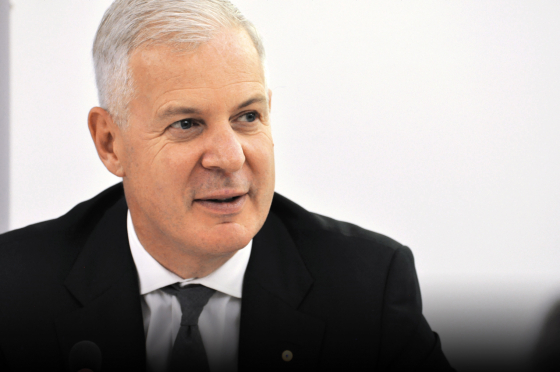The world faces a growing number of challenges that no single country - even the best resourced - can solve on their own. Whether it is managing risks in the global economy, maintaining peace and stability, or tackling climate change, collective action on the part of states (and other actors) is increasingly necessary to deliver an effective response to major global risks.
But while global governance is thus functionally necessary - and, moreover, normatively desirable - it is proving ever more difficult to deliver. What options are available to foster more effective cooperation between nations? What lessons can be learned from the multilateral response to recent crises? And what role might business play in shaping and delivering global governance systems that are fit for purpose in a deeply interconnected economy?
Keynote Speaker
John W.H. Denton AO is the Secretary General of the International Chamber of Commerce (ICC). He is a global business leader and international advisor on policy and a legal expert on international trade and investment.
In 2022, John was appointed by United Nations Secretary General to represent the global private sector on the newly formed Steering Committee of the UN Global Crisis Response Group on Food, Energy and Finance.
This year, John was appointed by the WTO Director General to represent ICC at the WTO Business Advisory Board group. He also currently serves on the WHO Foundation Strategic Advisory Group and the Global Task Force on Refugee Labour Mobility.
John is a Board member of the UN Global Compact and was appointed Chair of the UN Business and Human Security Initiative advisory board in February 2023.
John is a founding member of the Business 20 (B20), Co-founder of the Australia–China CEO Roundtable and Patron of UNHCR in Australia.
He serves on the Board of IFM Global Investors, a leading institutional investment manager, and is Chair of the Moeller Institute Advisory Board at the University of Cambridge.
He additionally serves on the Boards of the UN Development Programme’s Impact Investing Steering Group and UNICEF’s global education initiative, GenU, and he is a member of the Advisory Board of the African Green Infrastructure Investment Bank (AfGIIB) and the G7 Working Group on Impact Investment.
A former diplomat, John co-led the Australian Government’s 2012 White Paper on “Australia in the Asian Century” and previously chaired the APEC Finance and Economics Working Group.
Prior to joining ICC, he served for two decades as Partner and CEO of Corrs Chambers Westgarth, Australia’s leading independent law firm.
In 2015, John was appointed an Officer of the Order of Australia for his services to the business community, the arts and the rights of refugees, including as a founder of Human Rights Watch (Australia) and Teach for Australia.
Chair
Andrew Lynch is the Dean of the UNSW Faculty of Law & Justice. He has previously served as Head of School and Deputy Dean. He teaches and researches in the field of Australian constitutional law. His research concentrates on the topics of federalism, judicial dissent, judicial appointments reform, and legal responses to terrorism.
Andrew is an author of Blackshield & Williams’ Australian Constitutional Law and Theory (6th ed, 2014; 7th ed, 2018), Australia's Greatest Judicial Crisis - The Tim Carmody Affair (2016), Inside Australia’s Anti-terrorism Laws and Trials (2014), What Price Security? Taking Stock of Australia’s Anti-Terror Laws (2006), and Equity and Trusts (2001 and 2005). He is a co-editor of the books Law and Liberty in the War on Terror (2007), Counter-Terrorism and Beyond: The Culture of Law and Justice After 9/11 (2010), Tomorrow’s Federation: Reforming Australian Government (2012) and the editor of Great Australian Dissents (2016).
Between 2008-2013, Andrew was the Director of the Gilbert + Tobin Centre of Public Law at UNSW and he continues to work on research housed within the Centre’s Judiciary Project. He is a member of the Council of the Australasian Institute of Judicial Administration and a Fellow of the Australian Academy of Law.
About CIBEL Global Network Conference 2023
Reshaping the Global Economic Governance: Opportunities and Challenges for the Asia-Pacific Region
Global economic governance typically refers to the institutional, policy and regulatory framework established by governments to facilitate and manage their interaction and engagement in global economic activities. As the world emerges from the COVID-19 pandemic, there is a pressing need for governments to closely examine not only their own economic systems but also the global economic governance in light of the many new contexts. Numerous challenges lie ahead, including: the further rise of economic nationalism and protectionism, the persistent geopolitical confrontation between the world’s superpowers, the ever-greater fragmentation of the international legal order, the lack of progress in reforming key international institutions particularly the World Trade Organization (WTO), and difficulties and uncertainties in the pursuit of the shared goals of sustainability, inclusiveness and digitalisation. To address these challenges, international cooperation and communication is critical, with much of the collective effort increasingly focused on the Asia-Pacific region. Some recent and telling examples include the conclusion of the Regional Comprehensive Economic Partnership Agreement (RCEP), the US-led negotiations of the Indo-Pacific Economic Framework (IPEF), pioneering plurilateral and bilateral arrangements in the region such as the Digital Economy Partnership Agreement between New Zealand, Chile and Singapore and the Digital and Green Economy Agreements between Australia and Singapore, and the potential expansion of the Comprehensive and Progressive Agreement for Trans-Pacific Partnership (CPTPP) in the region and beyond. Understanding these and other significant developments, exploring potential opportunities and challenges, and strategically and actively engaging with the Asia-Pacific region, are thus of critical importance for reshaping global economic governance for the benefit of all stakeholders.
The 2023 CIBEL Global Network Conference & Young Scholars Workshop seek to promote academic and policy debate over the major opportunities for and challenges faced by governments in reshaping their own economic systems, as well as that of the global economic governance collectively, focusing on the role and impact of the Asia-Pacific.


